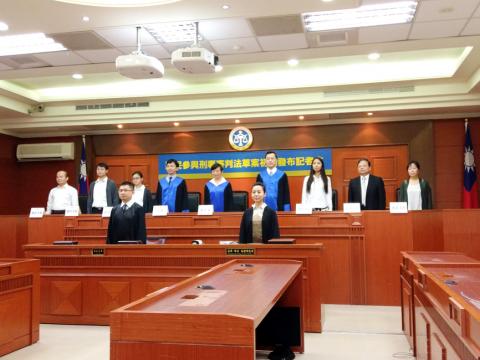The Judicial Yuan yesterday completed the first draft for a bill authorizing the public’s participation in criminal trials as so-called “citizen judges,” which received a mixed welcome from the nation’s legal professionals and judicial reform groups.
The bill, which contains 120 articles, establishes the rights and responsibilities of citizen judges on panels in criminal trials that would include professional judges.
Panels of three professional and six citizen judges would rule on criminal trials, ranging from offenses carrying a prison sentence of at least seven years to “homicide occurring in the intentional commission of a crime.”

Photo: Hsiang Cheng-chen, Taipei Times
The citizen judges would be selected at random, but they would have to be Republic of China citizens and at least 23 years old, among other qualifications.
People called to serve on the panels would receive a daily stipend and reimbursement for transportation and other expenses.
They would be forbidden from disclosing court information to the public until they have rendered a verdict or from asking for or receiving bribes in connection to their duties, or risk a prison term of less than 10 year.
The panels would require a two-thirds majority to render a guilty verdict. Should less than two-thirds agree on a guilty verdict, the panel would be required to either uphold the assumption of innocence or render a verdict in favor of the defendant.
Opening the halls of justice to the public would help educate people about the law and help the judicial system identify its shortcomings, one prosecutor said on condition of anonymity.
However, the random selection of citizen judges might result in the drafting of “rank amateurs,” a prosecutor said, adding that walking a panel through basic legal principles might add to prosecutors’ workloads.
Criminal trials could become more time-consuming, creating stress for defendants in pretrial detention and professional judges, the prosecutor said.
The bill should be seen as the Judicial Yuan’s response to the resolution of the National Congress on Judicial Reform, said lawyer Huang Di-ying (黃帝穎), deputy director of legal reform group Taiwan Forever Association.
“The bill’s conception of citizen judges is more progressive than the current judicial system, in which power is monopolized by judges, but the proposal still has room for improvement,” Huang said.
The bill would create a system that is closer to the Japanese system of lay judges than the common law system of “trial by jury” in the UK or the US, he said.
A jury system maintains a separation of powers, with jurors determining issues of fact and a judge ruling on issues of law, which is dissimilar to the Judicial Yuan’s mixed panel of citizen and professional judges, he added.
The congress voted itself into a deadlock when it tried to choose between the two systems, Huang said.
Additional reporting by Chen Wei-han

A magnitude 7.0 earthquake struck off Yilan at 11:05pm yesterday, the Central Weather Administration (CWA) said. The epicenter was located at sea, about 32.3km east of Yilan County Hall, at a depth of 72.8km, CWA data showed There were no immediate reports of damage. The intensity of the quake, which gauges the actual effect of a seismic event, measured 4 in Yilan County area on Taiwan’s seven-tier intensity scale, the data showed. It measured 4 in other parts of eastern, northern and central Taiwan as well as Tainan, and 3 in Kaohsiung and Pingtung County, and 2 in Lienchiang and Penghu counties and 1

FOREIGN INTERFERENCE: Beijing would likely intensify public opinion warfare in next year’s local elections to prevent Lai from getting re-elected, the ‘Yomiuri Shimbun’ said Internal documents from a Chinese artificial intelligence (AI) company indicated that China has been using the technology to intervene in foreign elections, including propaganda targeting Taiwan’s local elections next year and presidential elections in 2028, a Japanese newspaper reported yesterday. The Institute of National Security of Vanderbilt University obtained nearly 400 pages of documents from GoLaxy, a company with ties to the Chinese government, and found evidence that it had apparently deployed sophisticated, AI-driven propaganda campaigns in Hong Kong and Taiwan to shape public opinion, the Yomiuri Shimbun reported. GoLaxy provides insights, situation analysis and public opinion-shaping technology by conducting network surveillance

‘POLITICAL GAME’: DPP lawmakers said the motion would not meet the legislative threshold needed, and accused the KMT and the TPP of trivializing the Constitution The Legislative Yuan yesterday approved a motion to initiate impeachment proceedings against President William Lai (賴清德), saying he had undermined Taiwan’s constitutional order and democracy. The motion was approved 61-50 by lawmakers from the main opposition Chinese Nationalist Party (KMT) and the smaller Taiwan People’s Party (TPP), who together hold a legislative majority. Under the motion, a roll call vote for impeachment would be held on May 19 next year, after various hearings are held and Lai is given the chance to defend himself. The move came after Lai on Monday last week did not promulgate an amendment passed by the legislature that

Taiwan is gearing up to celebrate the New Year at events across the country, headlined by the annual countdown and Taipei 101 fireworks display at midnight. Many of the events are to be livesteamed online. See below for lineups and links: Taipei Taipei’s New Year’s Party 2026 is to begin at 7pm and run until 1am, with the theme “Sailing to the Future.” South Korean girl group KARA is headlining the concert at Taipei City Hall Plaza, with additional performances by Amber An (安心亞), Nick Chou (周湯豪), hip-hop trio Nine One One (玖壹壹), Bii (畢書盡), girl group Genblue (幻藍小熊) and more. The festivities are to